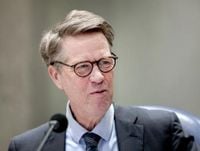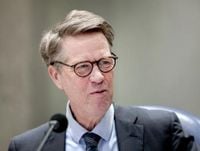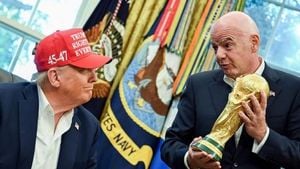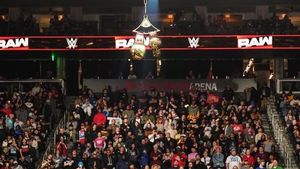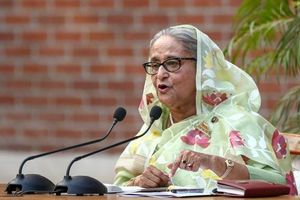On April 22, 2025, a shocking proposal by Martin Bosma, chairman of the Dutch House of Representatives, has stirred significant controversy in both the Netherlands and Belgium. During a diplomatic dinner with the French ambassador, Bosma suggested dividing Belgium, proposing that Flanders become part of the Netherlands while Wallonia aligns with France. This startling revelation was disclosed by journalist Petra de Koning in her weekly column for NRC, igniting heated discussions about national identity and the potential ramifications of such a radical idea.
The dinner, which included several members of parliament, reportedly left attendees stunned by Bosma's audacious suggestion. The proposal aligns with the so-called "Greater Netherlands" concept, previously hinted at by far-right politician Geert Wilders. Bosma's comments not only reflect his extreme right-wing beliefs but also highlight a growing sentiment among nationalist groups in both countries.
According to de Koning, Bosma's proposal was not entirely new; the idea of merging the Netherlands and Flanders has been circulating in certain political circles for decades. While it has found support primarily among extreme-right factions, such as Bosma's Party for Freedom (PVV) and the Vlaams Belang party in Belgium, it also raises questions about the current political climate and the future of Belgium's territorial integrity. Only Vlaams Belang has shown any interest in fostering closer ties with the Netherlands, indicating that broader support for such a radical change is limited.
During the dinner, Bosma acknowledged that discussions about politics and potential scenarios were indeed on the table but refrained from elaborating on the specifics of his proposal. "There was talk about politics and things that could possibly happen, yes," he stated, leaving many to wonder about the seriousness of his suggestion. The proposal's timing, particularly during a diplomatic gathering, has raised eyebrows and prompted questions about its implications for Belgium's sovereignty and relationships within the Benelux region.
Political observers have noted that Bosma's proposal could strain diplomatic relations not only between Belgium and the Netherlands but also with France. The prospect of altering national borders in such a manner is fraught with complexities, and the potential backlash from both the Belgian government and the international community could be significant. For now, there has been no official response from Belgian officials, but the political fallout from Bosma's remarks is likely to be felt in both countries.
Historically, the idea of a Greater Netherlands has had its supporters among various factions. Bart De Wever, the leader of the New Flemish Alliance (N-VA), has previously expressed sentiments regarding the cultural and historical ties between Flanders and the Netherlands. In an interview on July 21, 2021, he remarked, "I have never let go of the dream that all Dutch speakers would one day live together in one entity. If I could die as a Southern Netherlander, I would die happier than as a Belgian." Such comments illustrate that the notion of merging regions is not entirely without precedent in political discourse.
However, the current political landscape presents a different picture. While there are lingering sentiments about cultural unity among Dutch speakers, the practicalities of such a merger are far more complex. The dynamics of Belgian politics, which have long been marked by tensions between Flemish and Walloon communities, complicate any discussions about territorial changes. The potential for unrest and division is a significant concern for many observers.
Moreover, Bosma's declaration that the term "extreme right" is taboo in parliament adds another layer of complexity to the discussion. By distancing himself from labels that might alienate moderate supporters, he aims to position his party as a viable alternative in Dutch politics. However, this strategy may also backfire, as it could alienate voters who are wary of far-right ideologies.
As the debate unfolds, it is clear that Bosma's proposal has struck a nerve, prompting citizens and politicians alike to engage in discussions about national identity and regional cooperation. The implications of his remarks extend beyond mere political posturing; they challenge the very fabric of Belgian unity and raise pressing questions about the future of the region.
In light of these developments, many are left pondering: How will Belgium navigate its future amidst such divisive proposals? The country's leaders will need to address the concerns raised by Bosma's comments while also considering the sentiments of their constituents. The political landscape in both the Netherlands and Belgium may be on the brink of significant change, and the coming weeks will likely reveal how seriously Bosma's proposal is taken and what actions, if any, will follow.
As Europe grapples with rising nationalist sentiments, the conversation surrounding Bosma's proposal may serve as a litmus test for the resilience of national identities in the face of political extremism. With tensions already simmering, the need for dialogue and understanding among diverse communities has never been more crucial.
